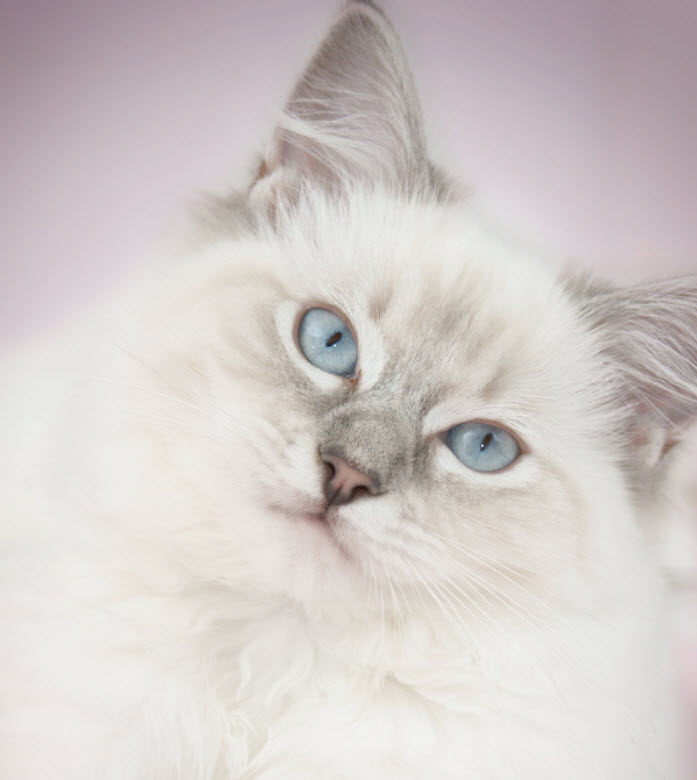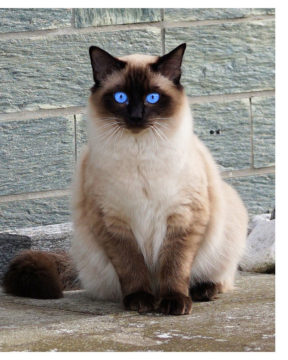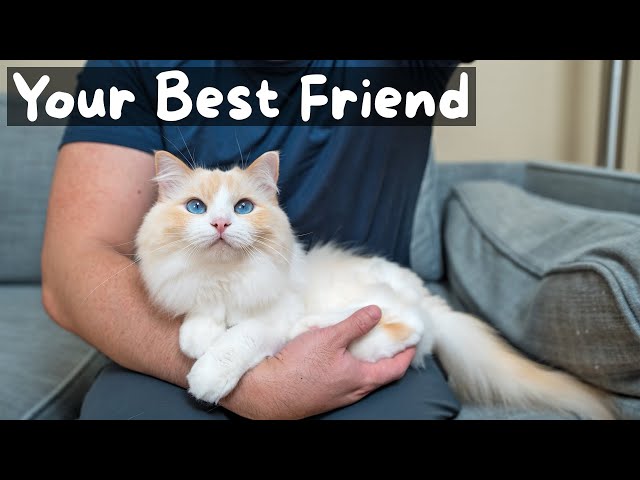Ragdoll cats can exhibit health issues, such as cardiac problems and urinary tract diseases. They also require regular grooming due to their long fur.
Ragdoll cats, with their striking blue eyes and affectionate personality, have captured the hearts of many pet lovers. Renowned for their docile and placid nature, these felines often become integral parts of family life, offering companionship and comfort. Despite these positive traits, prospective Ragdoll cat owners should be aware of several drawbacks.
Their luxurious, semi-long coat demands frequent brushing to prevent mats and tangles, which can be a substantial time commitment. Additionally, Ragdoll cats may carry genetic predispositions to certain health conditions, which may lead to costly veterinary care. In choosing to bring a Ragdoll into your home, it is crucial to consider both the joys and the potential challenges they may bring.

Credit: www.amazon.com
Challenges In Grooming Ragdoll Cats
For Ragdoll cats, beauty comes at a cost. Their stunning, silky fur needs constant care. Neglecting their grooming needs can lead to mats and discomfort.
High Maintenance Coat
The Ragdoll’s luxurious coat is known for its tendency to tangle. Regular grooming is crucial to keep their fur soft and shiny. Without care, the beautiful coat can quickly become a tangled mess. Think of their fur like fine silk, demanding your attention to maintain its elegance.
Regular Brushing Requirement
Brushing is a must for Ragdoll cats, several times a week if not daily. It’s key in preventing painful mats and controlling shedding. The length and density of their fur mean more time spent on upkeep. It’s not just a quick comb-through; each grooming session should be thorough.
Tools required include:
- A high-quality metal comb
- Long-toothed brush for deep fur
- Slicker brush for finishing touches
Remember, while grooming is a commitment, it’s also bonding time with your Ragdoll.
Health Concerns Specific To Ragdolls
When adopting a Ragdoll cat, it’s important to understand the health concerns specific to this breed. Ragdolls, known for their friendly nature and silky, semi-long hair, are susceptible to certain health issues. Being aware can help ensure a long, happy life for your furry friend.
Genetic Diseases
Like all purebred pets, Ragdolls carry a higher risk for genetic health problems. Two significant concerns are:
- Hypertrophic Cardiomyopathy (HCM): A common heart disease in cats causing thickened heart muscle.
- Polycystic Kidney Disease (PKD): Formation of cysts in the kidneys leading to organ failure.
Regular vet check-ups help catch these diseases early. Genetic testing is available for these conditions. It allows for appropriate health management.
Risk Of Obesity
Ragdolls are prone to weight gain due to their laid-back personality. Overweight cats face numerous health risks such as:
| Health Risks | Related Problems |
|---|---|
| Diabetes | Affects the cat’s ability to produce or respond to insulin. |
| Joint Issues | Arthritis and other mobility challenges can arise. |
A nutritious diet and regular playtime can help maintain a Ragdoll’s weight. Your vet can guide you on the best diet for your cat’s needs.
Behavioral Issues And Personality Traits
Ragdoll cats charm many with their gentle and affectionate nature. Yet, they do have unique behavioral traits. It’s crucial to consider these before welcoming one into your home. Let’s delve into some traits that might pose challenges for owners.
Separation Anxiety
Ragdoll cats often form strong bonds with their owners. They thrive on companionship and attention. When left alone, they may experience separation anxiety. This can lead to unwanted behaviors such as:
- Excessive Meowing: A lonely Ragdoll might call out often.
- Chewing: They may chew items from stress.
- Scratching: Furniture could become a target.
To help reduce the chance of these behaviors, consider the following:
| Strategy | Benefit |
|---|---|
| Create Busy Toys | Keeps their mind engaged |
| Companion Pet | Offers company and socialization |
| Regular Routine | Provides comfort and security |
Docility And Vulnerability
Ragdolls are known for their docile temperament. This trait can make them vulnerable in some environments. These cats may not always defend themselves or flee from danger. Here’s what owners should watch:
- Indoor Living: Safeguard them by keeping them indoors.
- Supervised Play: Ensure they are safe during outdoor activities.
- Proper Introductions: Introduce new pets or people cautiously to avoid stress.
By understanding a Ragdoll’s limitations, owners can better protect and care for their feline companions. Ensuring a safe and secure environment will help maintain their wellbeing.
Ragdolls And Multicat Households
Ragdoll cats, known for their docile nature, generally adapt well in multicat households. These affectionate felines often enjoy the company of other pets. Yet, like any breed, Ragdolls may face challenges. It’s crucial to understand potential issues for a peaceful home.
Hierarchy Struggles
Ragdolls are typically non-confrontational. This trait can lead to hierarchy issues among cats. Cats establish pecking orders. A more dominant cat may bully a Ragdoll. This bullying could lead to stress. To reduce struggles, provide plenty of vertical space. This helps cats establish territories without conflict. Cat trees and shelves work well.
Territorial Adjustments
Even laid-back Ragdolls need personal space. Territorial adjustments can be tough when a new cat arrives. Early introductions can ease tension. Keep each cat’s belongings separate at first. This includes beds, food bowls, and litter boxes. Introduce shared items gradually. Allow them to be near each other while enjoying their own spaces. Pheromone diffusers can also help calm the atmosphere.
Cost Implications Of Owning A Ragdoll
Are you thinking about getting a Ragdoll cat? They are cute and fluffy. But they also cost a lot of money. Let us look at how much money you may spend.
Initial Purchase Price
The first thing you pay for is the cat itself. Ragdolls are purebred. This means they can be expensive to buy. You may pay from a few hundred to several thousand dollars. It depends on where you get them and how they look.
- Breeder reputation: Good breeders charge more.
- Pedigree: Cats with champion parents cost more.
- Age: Kittens are pricier than adults.
Ongoing Health Care Expenses
Ragdolls are big cats. They need lots of care to stay healthy. Here are expenses you might have each year:
| Vet Check-ups | Shots | Special Food |
|---|---|---|
| Once a year | As needed | They eat a lot |
Ragdolls may also get sick. This will cost extra. Here are problems they can have:
- Heart Conditions
- Kidney Issues
- Hairballs from grooming
Remember to save money for emergencies. Your furry friend depends on you!

Credit: www.noahsarkvet.com

Credit: cuddleclones.com
Frequently Asked Questions For Negatives Of Ragdoll Cats
What Are The Disadvantages Of A Ragdoll Cat?
Ragdoll cats can be prone to obesity and may develop health issues like heart disease and urinary tract problems. Their long fur requires regular grooming. These sociable pets also demand significant attention and may suffer from separation anxiety if left alone frequently.
Why Not To Get A Ragdoll Cat?
Ragdoll cats require significant grooming due to their long fur. They can also display clingy behavior, needing constant companionship. High acquisition and potential healthcare costs are noteworthy with this breed. Ragdolls may not suit busy or budget-conscious pet owners.
Are Ragdolls High Maintenance?
Ragdoll cats are low to moderate maintenance pets. They require regular grooming due to their long fur and enjoy companionship but are generally laid-back and easygoing.
What Are The Personality Problems With Ragdoll Cats?
Ragdoll cats are typically docile and friendly. Some may develop separation anxiety due to their social nature. Proper socialization and attention can mitigate these issues.
Conclusion
Understanding the downsides of owning a Ragdoll cat is crucial for any potential pet owner. Despite their charming personalities and striking looks, challenges like grooming needs and possible health issues can’t be ignored. Carefully weigh these factors before welcoming a Ragdoll into your home, ensuring a happy, informed decision for both you and your fluffy companion.



